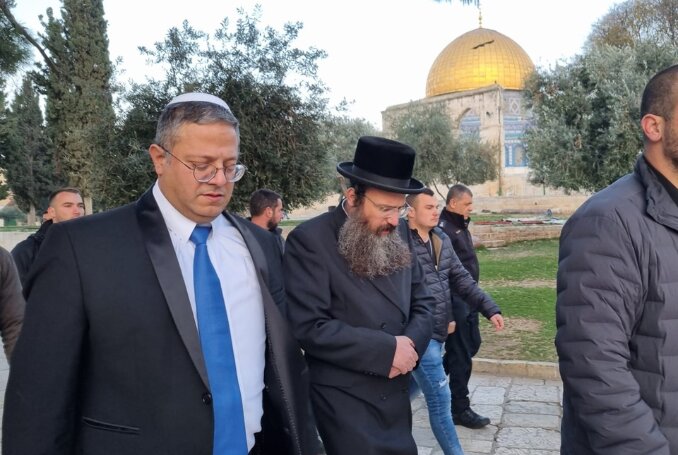The move was met with global condemnation and warnings of escalations in Jerusalem.
Qatar condemned “in the strongest terms” the Israeli Minister of National Security’s Itamar Ben-Gvir storming of the Al-Aqsa Mosque on Wednesday, a move widely slammed as “provocative” by Palestinians.
Ben-Gvir stormed the courtyards of the holy site under the protection of Israeli occupation forces (IOF) as part of his role in the “Religious Zionist” movement that seeks to expand Israel’s occupation of Palestine.
In a statement, Qatar’s foreign ministry slammed Ben-Gvir’s move as “a flagrant violation of international law and the Hashemite Custodianship over the holy sites in occupied Jerusalem.”
The Gulf state also warned “of the escalatory policy adopted by the Israeli government” while saying that “attempts to harm the religious and historical status of Al-Aqsa Mosque” constitute an attack on both Palestinians and “millions of Muslims around the world”.
“The Ministry of Foreign Affairs holds the Israeli occupation authorities solely responsible for the cycle of violence that will result from this systematic escalatory policy against the Palestinian people and their Islamic and Christian lands and sanctities,” the statement read.
Qatar called on the international community to “take urgent action” to halt Israel’s attacks, stressing its commitment to “the justice of the Palestinian cause”.
The Gulf state has long rejected nornalisation with Israel for its ongoing attacks against Palestinians while supporting the establishment of a Palestinian independent state on the 1967 borders with East Jerusalem as its capital.
Global condemnation
Ben-Gvir’s move was also met with condemnation by Palestinians officials and global governments.
Palestine’s President Mahmoud Abbas said he would seek immediate action from the United Nations to stop Israeli aggressions and raids into holy sites by the occupation’s government and settlers.
The Secretary-General of Palestinian Liberation Oorganization Executive Committee Hussein Al-Sheikh also condemned what he described as a “shameless storming” of the Al Aqsa Mosque.
“Ben Gvir’s shameless storming of AlAqsa Mosque, under the protection of the occupation forces and protected by the decision of his prime minister, is a prelude to a larger measure if there is no Palestinian, Arab, Islamic and international response to it,” the PLO official tweeted.
The Palestinian foreign ministry also said it holds Israeli Prime Minister Benjamin Netanyahu “responsible for Ben-Gvir’s storming of Al-Aqsa and its consequences”.
Meanwhile Jordan, which holds ties with Israel, summoned Tel Aviv’s ambassador to Amman in protest, according to the spokesperson of Jordan’s Ministry of Foreign Affairs and Expatriates Sinan Majali.
Turkey joined global condemnation and expressed its concern over “the provocative act”.
It also called on Tel Aviv “to act responsibly to prevent such provocations that will violate the status and sanctity of holy places in Jerusalem and escalate the tension in the region.”
Egypt’s Al-Azhar, the world’s top Islamic institution, said the storming of the holy site is “barbaric” behaviour.
The United States, Israel’s main ally, also said it was “deeply concerned” by the events on Tuesday while warning that changes to the status quo of Jerusalem’s holy sites is “unacceptable”.
Attacks on Al-Aqsa
Israel has been attempting to change the status of the Al-Aqsa mosque since it occupied Jerusalem in 1967 in what is widely known as “the naksa” or “catastrophe”.
Israeli settlers fully protected by the IOF have long raided the holy area, especially during the fasting month of Ramadan when thousands of Muslims perform joint prayers.
Ben-Gvir has repeatedly stormed Al-Aqsa, the home of the Dome of the Rock and Al-Aqsa mosque—the third holiest site in Islam. Last year, the minister called for the destruction of Al-Aqsa to “establish a synagogue on the mountain”.
The latest incident brings back similar scenes from 2000, when former Israeli prime minister, Ariel Sharon stormed the site in a move that sparked the second intifada, or Palestinian uprising.
Between 2000 and 2005, Israel killed at least 4,973 Palestinians, including 12-year-old Palestinian Muhammad Al Durrah, who was pictured hiding behind his father became an iconic moment.







